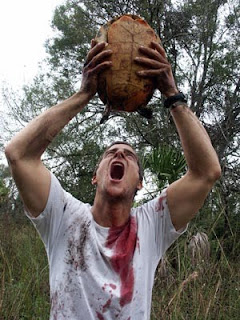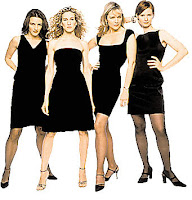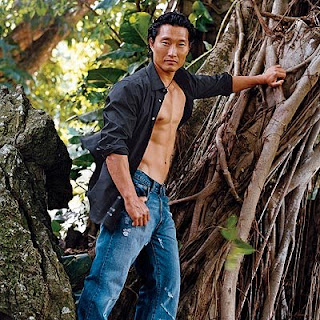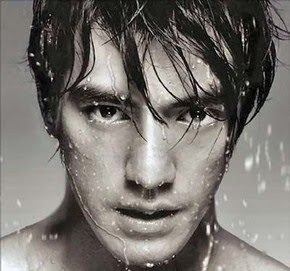
Asian: Because I am. Girl: Because I look like one. Professor: Because I want to be.
Monday, December 6, 2010
On Turning 30

Monday, November 1, 2010
A Sane Radical

If there were such a thing as The Daily Show generation, I would be a member of it. Jon Stewart took over the late night show on Comedy Central when I was in college, the time in my life when I started to form my political outlook. The show got me through graduate school (or, I should say, George W. Bush’s presidency, which almost perfectly coincided with the eight years I spent getting my PhD), the time in my life when I learned how to articulate and substantiate my political outlook. As 9/11 happened, as the nation’s unity shifted into vitriolic division, as the Bush administration launched two wars using justification that proved to be unfounded, and as American political discourse became increasingly absurd, The Daily Show became a source of catharsis. Watching the show, I didn’t have to feel weird or crazy for getting upset when “you’re either with us or against us” got branded as patriotism, for observing the irony in Sarah Palin's admiration for her daughter's "choice" to have her baby, for cringing anytime anyone who's not a murderous dictator gets compared to Hitler. In a time when the most insane politicians and pundits seem to get the most power and attention, The Daily Show has been one of very few voices that articulated what I often felt alone in feeling and thinking.
So it's no surprise that I was one of the estimated 215,000 people who attended Jon Stewart and Stephen Colbert's Rally to Restore Sanity and/or Fear this past Saturday. I wasn't sure if was going to turn into the progressive response to Glenn Beck's rally, if it was going to be an irony-fest for smug hipsters, or if it was just going to be one giant party. From where I was standing, it wasn't really any of these things. True, I got the sense that people in attendance identified themselves as liberal, since the overtly political signs largely poked fun at Christine O'Donnell, FOX News and the Tea Party. But people weren't there to push any particular political agenda. I didn't see anyone promoting any political candidates, in spite of the fact that the rally took place just three days before election day. I didn't even overhear any political discussions amongst the other attendees around me. I was pleasantly surprised by the age range of the people I saw. While my early morning bus to D.C. was full of college kids, I ended up sitting near a lot middle-aged folks, some of whom admitted that they didn't even watch The Daily Show. The energy was positive. People just seemed happy to be there, making room for each other, making sure that their signs weren't obstructing someone else's view, sharing snacks. This really was a gathering of reasonable people who wanted to make themselves visible as the non-insane majority of America.
I applaud Stewart's closing speech, his "moment of sincerity" in which he condemns both our political process and the "24-hour political pundit perpetual panic conflictinator" for projecting images of ourselves as angry, fear-mongering monsters incapable of compromise. Stewart was very careful in condemning extremists from both sides, saying at one point, "Why would you work with Marxists actively subverting our Constitution or racists and homophobes who see no one's humanity but their own?"
This is where I think Stewart missed an opportunity to talk about the substance behind the rhetoric. While extremism on any end of any political spectrum is never a good thing, we need to acknowledge that it is not the extreme left that is currently holding the microphone. It is not the extreme left that is calling President Obama is a fascist, claiming that that health care reform is tantamount to a Bolshevik takeover, that all Muslims are out to destroy America. I can't think of a single Marxist who is actively subverting our Constitution (never mind that Marxism in and of itself is not extremism), but people like Rush Limbaugh and Ann Coulter have made careers spewing racist and homophobic beliefs every day. Let us not forget, too, that our Congress still has room for former unabashed Klu Klux Klan members, such as Senator Robert Byrd, who died earlier this year. Our political terrain is so tilted to the right, that even "moderate" people are voting for laws that undermine a woman's right to an abortion, allow law enforcement officers to racially profile people, keep gay and lesbian Americans from getting married and serving in the military. Pundits and politicians from the left dare not suggest that we reduce defense spending, insist on a public health care option, grant citizenship to immigrants who have labored their whole lives in this country. There's no political payoff to stand by liberal policies, but it's politically safe to concede to conservative ones. No radical leftist party has gotten the kind of clout that the Tea Party has.
Stewart is right in saying, "When we amplify everything, we hear nothing." I would add that, right now, it seems like only one side is being amplified, and that's the only side we're hearing. Perhaps if there were an insane leftist ideological machine that was equally as influential as FOX News, we would get a better sense of where to locate the actual middle. Maybe people will realize that the liberal counterpart to FOX isn't NPR or even MSNBC. Maybe people will realize that Obama really is more of a centrist than he is a liberal. Maybe people will see that some reasonable and moderate people do dig the theories of Karl Marx, and some reasonable and moderate people are a little bit racist and homophobic.
The "Wall Street bailout" is one example of where right-wing fear-mongering has dictated what positions we're even allowed to take on any issue. Those hell-bent on taking down Obama and the Democrats have used it as an example of how "big government" is turning our country Socialist. There hasn't been a radical counterpart to this position, no prominent ideologue jumping for joy over the extent to which the government has to step in to solve our problems, nor any famous anarchist opposing the bailout with the belief that our financial system should collapse. The Troubled Asset Relief Program, which was actually signed into law by George W. Bush, not only prevented a complete collapse of our financial system, but has also been paid back in full and with interest. TARP was not at all a leftist conspiracy for a government takeover of Wall Street, but somehow it has been framed as one by the insane right. As a result, Obama gets no credit for following through on it, but John Boehner gets a lot of airplay decrying it and calling for it to be shut down. (Never mind that in 2008, when Bush was president, Boehner cried on the floor of Congress, begging his colleagues to vote for the bailout.)
Or, another example is the debate over the military's "Don't Ask, Don't Tell" policy. When the leftist position is one that is merely advocating for equal rights to all American serving in the armed forces, there isn't room in the political spectrum for someone like me, who is disturbed by the policy, but is even more disturbed by the fact the Department of Defense is the nation's largest employer. There isn't room in our political spectrum to even suggest a downsizing of our military industrial complex.
I can appreciate that the purpose of the rally wasn't to promote any particular political agenda. The rally may not have been as successful if it did. I just wish that Jon Stewart and Stephen Colbert had spoken more about the substance behind the rhetoric in addition to rhetoric itself. The problem in this country isn't that insane people from both sides of the political spectrum are yelling too much and making it impossible for anyone to compromise. It's that insane people from the right are the only ones yelling while everyone else is staying quiet. And their yelling is also setting parameters of what everyone else is allowed to support or reject. I don't believe that the solution is to encourage the insane left to do some yelling, but I do think we need to readjust the barometer before we all agree to "take it down a notch." We need to restore not only sanity, but an idea of what "moderate" really means. In today's political terrain, I get lumped in with the insane radicals, simply because the middle bar is so skewed to the right. And while I have no problems with identifying myself as a radical, I have to insist that my concerns are entirely reasonable and that my ideas for what would be better for this country are governed by careful thought. I may be a radical, but I'm also a sane one.
Sunday, September 19, 2010
How To Become A Professor (When You Don't Know What You Are Doing)-- Lesson 4: Know Your Audience
Friday, September 3, 2010
Marriage, According to Mom and Dad
Saturday, August 28, 2010
On Being a 30-Year-Old Child
Sunday, August 22, 2010
Mashers!

My brother and I will each be living on our own for the first time in our lives. This is how we shared our feelings about it.
Tuesday, August 3, 2010
Things I've Learned While Getting Settled Into the Northeast
 1.) Moving companies can deliver your stuff whenever the hell they want. In spite of my checking in with Mayflower, the company I hired, about the status of my cargo, they ended up delivering my belongings an entire week later than I had requested. And there's absolutely nothing wrong with this practice, so long as they deliver within the time range they give themselves. When I complained to the moving agent about the costs and inconveniences of being stranded in an empty condo, she simply said, "Well, technically we could have delivered your things as late as August 6." My advice to those who are doing a big move: Pack or immediately buy upon your arrival an air mattress, toiletries, plenty of underwear, and something to boil water in.
1.) Moving companies can deliver your stuff whenever the hell they want. In spite of my checking in with Mayflower, the company I hired, about the status of my cargo, they ended up delivering my belongings an entire week later than I had requested. And there's absolutely nothing wrong with this practice, so long as they deliver within the time range they give themselves. When I complained to the moving agent about the costs and inconveniences of being stranded in an empty condo, she simply said, "Well, technically we could have delivered your things as late as August 6." My advice to those who are doing a big move: Pack or immediately buy upon your arrival an air mattress, toiletries, plenty of underwear, and something to boil water in. Wednesday, July 14, 2010
No Goodbyes
Friday, July 2, 2010
When An Anti-Jingoist Watches Sports
 I don't really follow sports, and when I do, I don't ever swear allegiance to any one team. Maybe this has something to do with the fact that I grew up in San Jose, CA, a city that really only has the Sharks to claim as its national sports team. (And, really, who the hell here gives a rat's ass about hockey?) I suppose there are always the San Francisco teams to get behind, and I remember the 49-er frenzy when I was a kid, back when Joe Montana was a star. But for the most part, the notion of feeling personally affiliated with a sports team, and loyally supporting it, has always been kind of foreign to me.
I don't really follow sports, and when I do, I don't ever swear allegiance to any one team. Maybe this has something to do with the fact that I grew up in San Jose, CA, a city that really only has the Sharks to claim as its national sports team. (And, really, who the hell here gives a rat's ass about hockey?) I suppose there are always the San Francisco teams to get behind, and I remember the 49-er frenzy when I was a kid, back when Joe Montana was a star. But for the most part, the notion of feeling personally affiliated with a sports team, and loyally supporting it, has always been kind of foreign to me. Thursday, July 1, 2010
I want to have this man's babies.

Tuesday, June 29, 2010
Sen. Daniel Inouye, Senate President Pro-Tempore
 Not to undermine any honor due to Senator Robert Byrd, who passed away on Monday, but it is worth noting that his passing has created a void in the position of Senate president pro-tempore. This position is filled by the longest-serving member of the majority party, who is now Senator Daniel Inouye (D-Hawaii).
Not to undermine any honor due to Senator Robert Byrd, who passed away on Monday, but it is worth noting that his passing has created a void in the position of Senate president pro-tempore. This position is filled by the longest-serving member of the majority party, who is now Senator Daniel Inouye (D-Hawaii). Sunday, June 27, 2010
When Nerds Attempt to Hook Up
 I know several people who met their significant others at a work-related conference. I suppose this makes sense, given that the conditions are ideal for a hook-up. You're at a hotel already. You get to meet people with similar interests as you do, and everyone is dressed up and looking nice. And after or in between all the conferencing stuff, every social and networking occasion involves alcohol. And you're there for only a few days, so you'd might as well have a little fun while you're working.
I know several people who met their significant others at a work-related conference. I suppose this makes sense, given that the conditions are ideal for a hook-up. You're at a hotel already. You get to meet people with similar interests as you do, and everyone is dressed up and looking nice. And after or in between all the conferencing stuff, every social and networking occasion involves alcohol. And you're there for only a few days, so you'd might as well have a little fun while you're working.Friday, June 25, 2010
Good Friends/ Bad Friends
Monday, June 21, 2010
Stuff White People Like: Chinese Parents' Edition
 I was watching tv with my parents a few nights ago when we stumbled upon the Discovery Channel, which was broadcasting a marathon of Man Vs. Wild, starring Bear Grylls. Though I generally have no interest in the wilderness or how one would survive in it, I kinda love the show. I excitedly described to my parents some of Bear Grylls's nastiest antics: finding drinking water by squeezing it out of fresh elephant dung, hollowing out a camel carcass to use as shelter, and drinking turtle blood (pictured). Coincidentally, the episode we happened to catch was a countdown of Bear Grylls's 25 favorite moments, so my parents got a condensed helping of the show.
I was watching tv with my parents a few nights ago when we stumbled upon the Discovery Channel, which was broadcasting a marathon of Man Vs. Wild, starring Bear Grylls. Though I generally have no interest in the wilderness or how one would survive in it, I kinda love the show. I excitedly described to my parents some of Bear Grylls's nastiest antics: finding drinking water by squeezing it out of fresh elephant dung, hollowing out a camel carcass to use as shelter, and drinking turtle blood (pictured). Coincidentally, the episode we happened to catch was a countdown of Bear Grylls's 25 favorite moments, so my parents got a condensed helping of the show. Thursday, June 17, 2010
Home:Word

I am totally hooked on THIS ALBUM. I've sort of kept an eye on Magnetic North (a duo comprised of emcees Derek Kan and Theresa Vu) ever since I was introduced to their cover of "Drift Away." So when I learned that they collaborated with Taiyo Na, an artist whose work I've also recently come to admire, I had to buy the album right away. Besides, I'm always on the lookout for Asian American talent. Even better, socially conscious Asian American talent.
We Did It!
 My commencement ceremony was last Thursday, which was then followed by my brother's commencement on Friday. And if graduations were typically celebrated with the kind of hoopla that weddings are, my family would certainly know how to play up the pomp and circumstance. It doesn't matter that graduation ceremonies are tedious and boring, and that attending two of them in different states within a span of 24 hours was going to be one big pain in the ass. My family makes recognizing educational achievement a top priority. I'm pretty sure my mom would be more upset if I were to ditch my PhD commencement than if I were to get hitched via elopement.
My commencement ceremony was last Thursday, which was then followed by my brother's commencement on Friday. And if graduations were typically celebrated with the kind of hoopla that weddings are, my family would certainly know how to play up the pomp and circumstance. It doesn't matter that graduation ceremonies are tedious and boring, and that attending two of them in different states within a span of 24 hours was going to be one big pain in the ass. My family makes recognizing educational achievement a top priority. I'm pretty sure my mom would be more upset if I were to ditch my PhD commencement than if I were to get hitched via elopement. Tuesday, June 8, 2010
Open Letter
Thursday, June 3, 2010
The Real Estate Pain-in-the-Ass That Nobody's Telling You About
Monday, May 31, 2010
Big Step
Sunday, May 16, 2010
Sex and a City of Hot Asian Men

Last night, a good friend of mine hosted a Sex and the City party, in which we wore our cutest shoes, drank girly cocktails and watched our favorite episodes of the series. Revisiting the series reminded me of how neatly it manages to encapsulate the thrills and frustrations of being a single woman. The "A Woman's Right to Shoes" episode points out how much money I've spent on friends' weddings and baby showers, and dares me to register for gifts so that all those bitches have to validate my life choice of getting a PhD. (After all, the 8 years I took to get the degree is longer than the duration of any of their marriages so far.) I also can't help but applaud when Carrie goes on her rant after being dumped via Post-It note. As a woman whose last long-term relationship ended with the guy breaking up with me over the phone and then never talking to me again, and as as single gal who recently went on a date that ended with the guy giving me a Christian side hug, I also think that an ending that is thoughtful and decent shouldn't be too much to ask for. I guess the fact that so many women could relate to the show, in spite of its fantasy-creating glamour, is what made it successful.
 Daniel Henney
Daniel Henney










